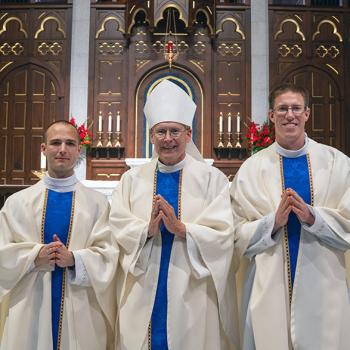When I was 16 years old, I worked in a grocery store. My parents were divorced, money was tight, and I needed the job to pay for my car and insurance. So when my manager told me I was working on Christmas Eve, I couldn't put up much fuss.
"Son, I know full well it's a holiday," this good Oklahoma Southern Baptist told me when I asked about the schedule, "but people still got to eat."
Last week, Senators John Kyl (R-AZ) and Jim DeMint (R-SC) expressed their indignation that the U.S. Senate would be working during the Christmas holidays. Kyl argued that Senate Majority leader Harry Reid (D-NV) was offering disrespect to "one of the two holiest days for Christians," and DeMint called it "sacrilegious" to vote on a spending bill and nuclear arms control treaty during Christmas. Reid, for his part, argued that many of his constituents would be working during the holidays. Why shouldn't the Senate finish its work?
Although America is not a theocracy, Christianity is still culturally dominant, and, this time of year especially, culturally prominent, so the question is worth exploring: Is it sacrilegious for the United States Senate to work during the Christmas holidays?
Theologians seek to understand ethical and religious questions by looking first at holy scriptures, then at the Christian tradition and shared experience. In many cases that arise at this time of year (as with whether or not public Christmas displays should be allowed, or whether saying "Merry Christmas" is a holier alternative than "Happy Holidays"), the scriptural record has little to say about knotty cultural problems. In the case of holy days, however, the Bible actually speaks up, although what it says requires interpretation.
If Senators DeMint and Kyl are sincere in their concern, they seem to be referring to a tradition originating in the Hebrew Bible (called by many Christians the Old Testament), wherein the Sabbath was set aside as a day holy to God and on which no work should be done. The Ten Commandments reserve the holiness of this day set aside for worship and reflection, and this requirement is repeated throughout the books of Exodus, Leviticus, Nehemiah, and Jeremiah. In the Jewish tradition, some days are holy to God, and one should not work.
For Jews and Christians alike the Hebrew Bible has authority, but for Christians, a more authoritative question has to be, What did Jesus have to say about this question? In the Christian Testament (called by many Christians the New Testament), Jesus is represented as constantly at odds with religious leaders who argued for the absolute sanctity of God's holy day.
Holiness mattered to Jesus—but human life and dignity mattered more.
When Jesus' hungry disciples plucked grain to eat on the Sabbath, for example, Jesus responded to outraged observers by reminding them that a hungry King David once ate bread consecrated on the high altar. The followers of Jesus were likewise picking grain to preserve their own lives, something of even higher value to God than observing rules about sanctity. The Sabbath was made for the benefit of human beings, Jesus told his detractors, not the other way around (Mk. 2:26-27).
On another occasion recorded in the Gospels, Jesus prepared to heal a man with a withered hand, although scribes and Pharisees stood watching closely, ready to condemn him for laboring on the Sabbath. Jesus healed the man after asking his opponents this leading question: "Is it lawful to do good or to do harm on the sabbath, to save life or to destroy it?" (Lk. 6:9, NRSV) As Martin Luther King, Jr. used to say, the time is always right to do what is right.
On another occasion (there are others still), Jesus spoke about those who were—or at least pretended to be—so concerned with following rules about holiness that they ignored the rules God gave about the sanctity and dignity of human life. Jesus spoke directly to those who were not honoring their father and mother by caring for them in their old age, but instead were giving that money to the temple. "Hypocrites," Jesus told such people, "for the sake of your tradition, you make void the word of God" (Mt. 15:6, NRSV).
When Jesus boils down his ethical teachings in the Gospels, it is consistently about caring for others, whether at the conclusion of the Gospel of Matthew, where Jesus says that his followers will be known because they feed the hungry, heal the sick, and care for those in prison, or at the conclusion of the Gospel of John, where he tells Peter that if he loves Jesus he will care for Jesus' sheep, his followers.
The Christian tradition bears out that people are always more important than rituals or holy days. To cite but a few of the best-known examples, Augustine spoke often about the two-fold commandment of love for God and love for our neighbors, and he argued that we demonstrate our love of God most powerfully through loving our neighbors. Thomas Aquinas, for his part, remarked that "when a human act does not conform to the standard of love, then it is not right, nor good, nor perfect." And how can it be loving to fail to care for our neighbors because of Christmas?





